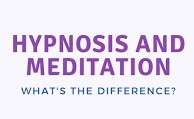Hypnotic Meditation
The process of clearing the mind to achieve a state of relaxed and focus with extreme self-focus and attention giving minimum attention to external stimuli is known as hypnotic meditation. In simpler words, hypnotic meditation is a deep relaxation process through the state of consciousness where a person loses the power of voluntary actions and is highly responsive to suggestion or direction.
Hypnosis is a natural state of mind that we all experience daily. Apart from meditation, the hypnosis technique is used to draw important information from people like criminals, officers, etc. Hypnotic meditation is simply another name of guided meditation. Among various meditations that are just guided visualization, relaxing process to drive you to an imaginary journey, hypnotic meditation is one of them.
Hypnosis Vs meditation
Meditation is a step to enter a hypnotic state. Meditation reduces activity in the brain while hypnosis increases brain activities. Hypnosis and meditation are figuratively vast conceptual colleges of imprecise multiple meanings and observations. According to theorists of human consciousness, both hypnosis and meditation are secondary phenomena: in the sense that both of them are culturally defined shaped modes of thoughts, behaviours, and experiences.
Hypnosis always needs a therapist but mediation can be done alone without any instructions. Hypnosis and meditation are duels without a clear winner. The next reason why they are considered the same is they both are shrouded in myths. People still believe that hypnosis is all about making people hypnotized and make them dance like chicken and ninja. However, they all are false.
Is hypnotic meditation safe and legal?
Hypnotic meditation is legal when it is conducted in clinics or certified centers with proper guidance and support. Hypnosis conducted by a trained therapist or health care professionals is considered safe. They are complementary and alternative methods of medical treatment. However, it may not be safe for people with mental illness.
Some people may get side effects of hypnotic meditation like headache, drowsiness, dizziness, anxiety, etc. With proper caution, hypnosis is proposed as a method to work through stressful events from earlier in life. Only trained professionals and health care therapists can perform this task for us.
You do not need any type of special preparation to be a part of hypnosis. Make sure you wear comfortable breathable cloth that will help you to relax. Choose a therapist or professionals who are certified, hypnosis performers. Seek recommendations and advice from people and only choose trustworthy people.
Your therapist will explain all the process of hypnosis to you. Then the therapist will typically start to talk in a gentle and soothing tone describing situations and images to create a sense of relaxation and security. When you are in a receptive state, the therapist will suggest you the way to achieve your goals and helps to visualize vivid, meaningful mental images of yourself accomplishing the goals.
Benefits of hypnotic meditation
- The hypnotic state is characterized by relaxation and a lack of inhibitions.
- This meditation will offer the person to be more open to discussions and suggestions.
- It helps to manage depression and stress.
- Hypnotherapy is also used to help with pain control and to overcome habits such as smoking or any addiction.
- It is also very beneficial to reduce disorders, phobia, fears, and anxiety.
Risks of hypnosis
It is used to recover repressed memories but it may also pose a risk of creating false memories. Using hypnotherapy for disassociative disorders remains controversial. It may not be appropriate for a person with psychotic symptoms, such as hallucinations and delusions.
